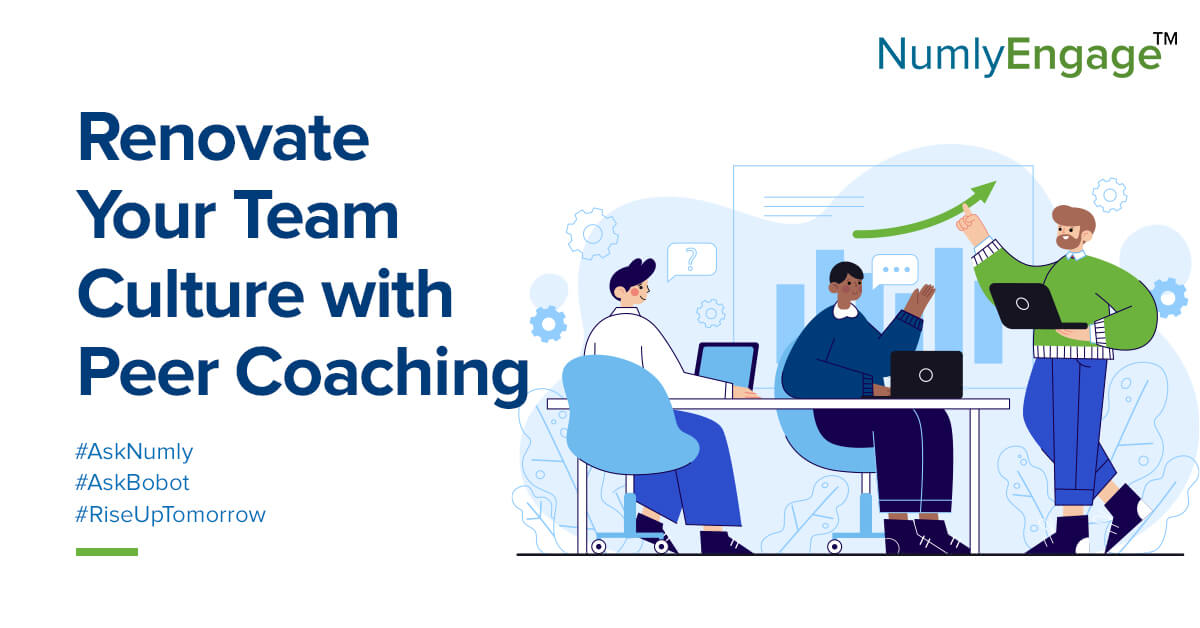The future of work is hybrid, and it is now.
As we move steadfastly into the hybrid work model, it becomes abundantly clear that this world of work will need new skills and approaches. In the post-pandemic world, organizations will have to re-evaluate the drivers of employee engagement and employee experience since the older drivers of engagement no longer remain valid.
With the economy ahead promising to be unquestionably different, organizations have to now focus on upskilling initiatives to thrive in this new world order. New skills, processes, working mechanisms, systems of collaboration, team building, and new ways of thinking are the need of the hour. These cannot be addressed with a day-long training program. Developing these new skills to thrive in today’s complex work environment needs focused and continuous learning. Something that organizations can achieve with peer coaching.
Read: Peer Coaching – The Critical Pillar to Drive Employee Experience and Engagement in Hybrid Workplaces
But how can organizations create a peer coaching culture?
Develop an army of peer coaches
To create a peer coaching culture an organization needs peer coaches. Looking at the employee base and identifying the natural coaches in their midst is the first step. However, often people themselves are unaware of their coaching capabilities. Helping people identify their inherent coaching capabilities assists in identifying peer coaches who can contribute to the organizational learning environment.
Apart from the ones who are naturally disposed to coaching, organizations can also look at high-performing employees or those employees who show exceptional technical or power skills and coach them to become peer coaches.
Managers can identify the potential coaches in their teams according to their skills and make them a part of the peer coaching network. Managers themselves can embark on a learning journey and take coaching to become good peer coaches.
Read: Help your Leaders Transition to a Digital World – Start Peer Coaching Initiatives
Destigmatize asking for help
It is heartening to see that organizations are now paying close attention to their employee’s mental health. With the pandemic pushing employees towards burnout, the conversation around mental health and seeking help to alleviate stressors has become mainstream.
Seeking help has been stigmatized as a sign of weakness for the longest time and it is time to change that.
There are many who are still not sensitized to the unique challenges of their peers. Setting up a peer coaching culture helps in beating stigmas and creates a healthy work environment by educating people on the importance of mental health and the adverse impacts of poor mental health and burnout. Actively identifying toxic behaviors and addressing them, sends out a strong message, that only healthy habits that are conducive to the workplace shall be encouraged.
Peer coaching helps people become more self-aware by providing contextual information. Since it is a continuous and non-judgmental process, people are more open to receiving feedback. The continuous nature of the program also makes sure that people can circle back to their coaches when they find themselves falling into unhealthy work patterns or ideologies. Proactive support provided by peer coaching makes sure that the behavioral change needed to destigmatize aging concepts is implemented and internalized.
Promote continuous learning
To develop a peer coaching culture, organizations have to work towards developing a culture that promotes continuous learning. This ties in with the need of the times, where changing business dynamics, a rapidly evolving technology landscape, and the increasing focus on digital transformation demand new skill sets. What is clear is that the pace of change we are experiencing is only going to accelerate in the post-pandemic world.
The needs of the hybrid workplace also demand the learning of new power skills and the unlearning of certain old methodologies. Organizations that offer avenues to improve their employee’s skill sets by helping them identify their learning needs using contextual data are more likely to see an invested, engaged, and productive workforce.
Encouraging continuous learning also drives a peer coaching culture as then the workforce is motivated to lean in towards their coaches to seek guidance on how to best navigate their work environments and ensure that they can remain on a growth path.
Lead by example
Peer coaching can play a big role in helping leaders develop and evolve their leadership styles to suit the hybrid work environment. Managers now have to evolve and become virtual leaders from remote bosses. It is time for organizational leaders to lead by example and leverage peer coaching and become peer coaches themselves to navigate the challenges of this hybrid workplace.
When employees see people of authority encouraging, seeking, and participating in peer coaching, it also prompts them to follow their example. The goal of peer coaching is to help each other find solutions and unlock an individual’s potential to maximize their performance. When employees across the organization see seniors taking the right steps to enhance their performance and learn new behaviors and skills to thrive in the hybrid workplace, they are also motivated to follow the same. The legitimacy that peer coaching gets from leadership involvement helps in establishing a strong peer coaching culture within the organization.
In Conclusion
With no playbook telling us how to manage these challenging and inexperienced times, developing a peer coaching culture becomes imperative as we go back to work. The workforce today needs understanding, empathy, and support more than ever before to forge ahead in their career paths. Establishing a peer coaching culture in these times gives employees the support that they need to validate and activate knowledge, reduce work-related stressors, identify growth paths and avenues of improvement, and increase engagement. All of these factors contribute towards a healthy and resilient workforce- one that is completely ready to manage the upheavals and uncertainties that the future holds.
Connect with us to see how our AI-powered coaching platform can help you deliver a robust and thriving coaching culture across your organization.

